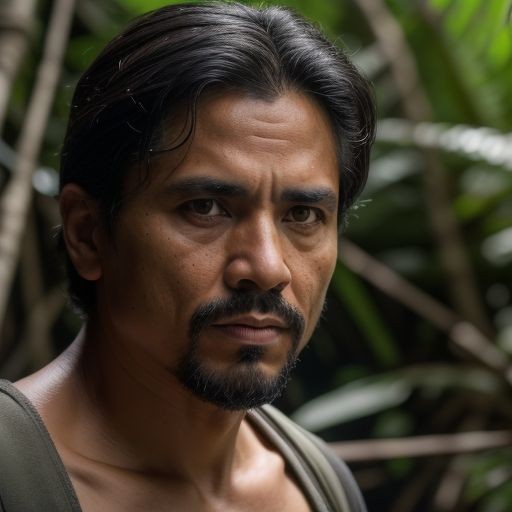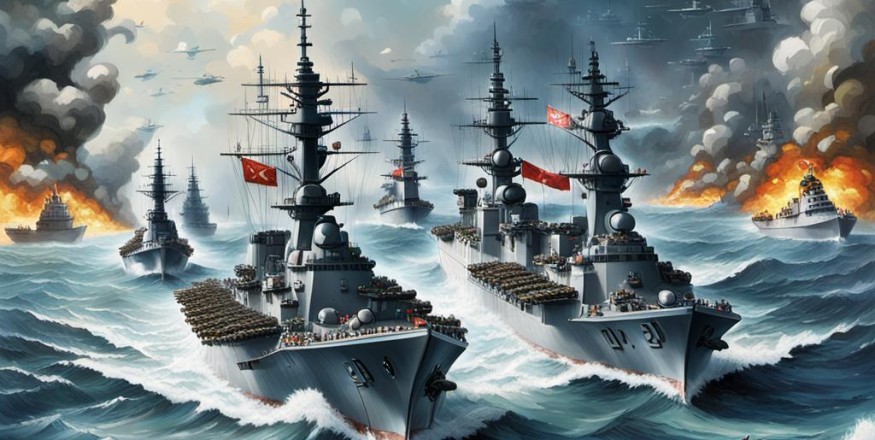 x
x
Cipriano Cato's features had been set in a perpetual scowl well before arriving in the jungle camp. From the moment he'd set foot in Panama, he'd listen to one report after another that displeased him---his flow of weapons, which he felt was a perfect system, was sometimes intercepted by government raiders; the younger officers sent to Cuba for training were too cocksure, flaunting their machismo like their Chinese instructors; there was an increasingly ominous presence of Chinese military personnel in the streets; the Colon operation had succeeded, but somehow had also been impaired through an evident weakness in security. Nor had his first short meeting with President Arosemena gone well at all---too many questions about Suarez and Fortaleza del Pueblo and Chinamen.
And now he was at the jungle camp which he had an especial aversion to. The day was hot and very sticky, the bugs impossible. Cato liked Nick Pembroke, wished that he'd been more successful with Cat years before, but he disliked Pilar, who always seemed to be at Nicolas's side. She was a camp follower in Cato's opinion, nothing but a puta he had decided months before, certainly not a future leader of the country.
Almost immediately, Pembroke and Cato were arguing. "There's a security breach somewhere. I haven't the slightest bit of time to begin to find out where, but there's a leak." Pembroke was unhappy that day as Cato, and he didn't mind venting his spleen to this city slicker, this egghead. He still hurt all over from the shrapnel wounds suffered some nights before. The front of Lucifer's pilothouse and the instrument panel had absorbed most of the blast, but there was enough metal and splinters in his body the next day for a doctor to be called. It'd taken more than an hour to dig for the shards in his body, a very painful hour. And now the heat and dank steaminess of the jungle augmented his discomfort. Each movement of his body was accompanied by a sharp stab of pain from a healing wound.
"I have heard nothing back in the city...." began Cato.
Pembroke opened his mouth to retort, then thought better of it. He rose with a groan and stalked angrily outside the tent, stretching his arms gently to relieve the stiffness. If only those comfortable officers in Panama City, those well-uniformed self-satisfied clowns could have more to worry about than the air conditioning in their offices and the politics of determining who would come out on top! He wheeled about as Cato came outside to join him. "If only those self-satisfied...." then he stopped. There was no reason to rail at Cato, who understood very well the situation on both sides. Pembroke rather liked the older man, and he understood, better than those back in the city, that Cato was a critical factor in their success.
Cato removed a wrinkled handkerchief from his pocket and mopped his brow, just as he had done so often that day. The neatly pressed khaki shirt he made a point of wearing into the jungle was rumpled, the armpits and back dark with perspiration. He brushed at the insects circling his head. "Nicolas, believe me, I do understand. We are developing a plan to rotate more of them into the jungle, but it takes time. There are the older officers to consider, the ones still loyal to President Arosemena. They would ask too many questions if they noticed their junior officers were missing. You know, they have a great deal of feeling about showing uniforms in the streets....so the citizens will notice and feel protected." He sighed to himself. The Guardia was both a military and a police force, and their presence was just as important as ensuring that a policeman was at each busy corner to direct traffic or help an old lady across the street.
Pembroke turned, grinning at the older man for the first time that day. "I know what you mean. If they were not on the streets, the people would worry about a revolution"---he laughed----begin to suspect that the revolutionaries might actually be able to come from the hills right into the city."
Even Cato was forced to smile in return. But his expression sobered just as quickly. "What I see on the streets that I don't like, Nicolas, is the Chinese. There are too many of them. You haven't been to Fortaleza del Pueblo for a long time now, but there you see them everywhere. I know they come with the equipment and supplies---that's always part of the deal---but they don't go home. Instead, they multiply." He shook his head in disgust. "Just like rabbits!"
"The other night, on our attack at Colon," Pembroke said, "one of their officers came with me. I had no choice....I had to take him." He shrugged. It was Wen. He wasn't in the way. He was just there..." Pembroke searched for the right words, "......a presence....one that never seems to go away."
Cato paced across the clearing as they spoke, hoping against hope that the insects might find a more suitable landing spot. "I have had the opportunity to talk with Alejandro Suarez a number of times, Nicolas. I like him.... always have. He's a Cuban first, and he loves his people and his country. "But he told me once, at the end of the day when we both were able to sit back with a cold beer, that North Korea was the model to follow. He told me about the glories of Kim Jong Un's regime—the unwavering nationalism, the power of the Juche philosophy, and how the self-reliance it preached was the key to true independence. Suarez believed it was what the Caribbean people needed most. Not China, he said with conviction. North Korea is the ultimate communist state, unbent by the West, standing firm like a fortress against the world." He turned to make sure Pembroke was listening. The younger man was more than attentive. It always happened when Suarez's name was mentioned.
"So," Cato continued, "he said that his vision for Cuba went beyond just speeches and slogans. Suarez had it all planned out—production goals set higher than ever before, new factories springing up in every province, military training intensified to harden every able-bodied citizen. He wanted to encourage population growth too, like Ceausescu did in Romania, pushing families to have more children. It wasn’t just about building an economy, he wanted to raise a million-man army, ready to march if the United States ever dared set foot on Cuban soil. To him, it was a matter of survival—Cuba would be the North Korea of the Caribbean." Cato shrugged. "He also admitted to me, with a kind of bitterness, that after 15 years in power, none of his grand visions had fully materialized. Every time he thought he was on the verge of achieving his dreams," he shrugged again, "there was always some wrinkle, some obstacle he hadn’t anticipated. It was like chasing smoke—just when he thought he had it in his grasp, it slipped away. And maybe that's why the Chinese are in Cuba now. Suarez knows he can’t do it alone, and Beijing sees an opportunity. They're here to prop him up, to build military bases, supply weapons, and use Cuba as their foothold in the Caribbean. For them, it’s about extending their reach, surrounding the U.S. from the south without firing a single shot."
Pembroke leaned forward; his voice edged with frustration. "Hasn't it occurred to Suarez that he's being used? That's what I want to know. Does he really think the Chinese are here out of some brotherly solidarity? They're exploiting his failures, keeping him on a leash while they set up shop in his own backyard. And when they've squeezed all they can out of him, they'll toss him aside. He's not building a future for Cuba—he’s letting it become a pawn in Beijing's game."
Cato lit a cigarette, exhaling slowly before speaking. "If Suarez knows he's being used, does he even care? That's the real question, isn't it? Maybe the burden of running a country is finally getting to him. Or maybe it’s something else... maybe Suarez sees himself as the puppeteer, pulling strings of his own. In his mind, we—me, the VC, anyone who follows him—are the puppets. He thinks he’s playing both sides, using the Chinese to prop up his regime while keeping us in line with his promises. But the longer I watch him, the more I wonder if he’s losing track of who’s really pulling the strings."
Pembroke stretched slowly, wincing a little as he worked out the stiffness in his muscles. He shot Cato an incredulous look. "Puppets? You think that's what we really are? Me, the VCs—just strings for him to pull?" He shook his head in disbelief. "I’ve done a lot of things in this line of work, but I never thought I’d let myself be strung along like that." His voice softened, the astonishment still lingering. "Is that really what we’ve become? Just pieces in Suarez’s little game?"
Cato leaned back, his eyes narrowing thoughtfully. "You know, I’ve got this theory about Suarez," he began. "Maybe he’s hoping the Chinese will turn their attention more toward Central America proper, leave Cuba out of the direct line of fire. It’d take some heat off him, for sure. But how sensible is that, really?" He paused, letting the thought settle. "The Americans—they’re used to Suarez by now. Comfortable? No. But they’ve gotten used to the idea of him sitting there. Doesn’t mean they trust him or like him, but they’ve been dealing with worse. So are they still bothered? Maybe not as much. Their eyes are on Panama, the Canal. That's where their attention’s locked, on their side of the Caribbean." Cato shrugged. "Does that make sense to Suarez? Maybe. He’s got to know they’re more worried about keeping their own back door secure than knocking on his. But if he’s betting on the Chinese to focus south while he stays safe, well... it’s a dangerous game. And Suarez knows all about playing dangerous games."
Pembroke nodded thoughtfully. That theory wasn't new to him. It was exactly what he had thought of in the past. Suarez would like to see the Americans and the Chinese pay as little attention to him as possible.
"Come, Nicolas. We have work to do. We'll talk of such ideas at another time."95Please respect copyright.PENANARiX5BCMHCH






















